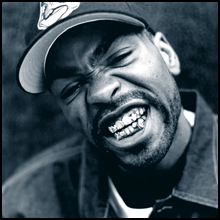![[Sidebar]](/standard/image/sidebar.gif)
![[Music Reviews]](/standard/image/headers/music_reviews_header.gif)
| clubs by night | club directory | bands in town | concerts | hot links | reviews & features |
Wu Tangents
Method Man and the RZA
by Carly Carioli
Method Man
Here's a curious coincidence. A feature about Method Man's new T2: Judgement Day (DefJam) on MTV's Web site is accompanied by an adventure-hero comic strip starring his likeness. And a similar comic strip in the underground hip-hop magazine Stress stars Bobby Digital, the b-boy cyborg character created by the Wu-Tang Clan's brilliant producer Robert Diggs, better known as the RZA, on his latest album.Their roles in the Wu-Tang Clan couldn't be more disparate: Method Man, the media-savvy, charismatic standout, and the RZA, the eccentric, reclusive, behind-the-scenes mastermind -- the Voice and the Man Behind the Curtain. But they both make great comic-book heroes, and they might be the first hip-hop stars to understand the importance of using masks to step outside oneself in a genre that has been most unforgiving to performers who represent themselves as anything other than who they "really" are.
The most reliable model that hip-hop has for alter egos comes from the movies. The RZA Presents Bobby Digital in Stereo (Gee Street) isn't technically a solo album (his proper solo debut is due early next year). It's the soundtrack to a Master P-style direct-to-video film -- a blaxploitation drama based on Digital, a ghetto superhero somewhere between Shaft and the Six Million Dollar Man who discovers a reality-altering psychedelic substance granting him passage into other worlds. This role gives the RZA license to construct one of the most bizarre hip-hop albums ever -- a fever-dream black Fantasia. And though he's invented a new slang to emphasize the dominance of things "digital" over things "analog," Bobby Digital is aesthetically closer to a four-track bedroom project. The basis for many of the tracks is a drum beat overlaid with keyboards humming fractured symphonies -- lo-fi Casio compositions filled with the sounds of '80s video games. "N.Y.C. Everything" buzzes and ticks and twitches like a kitchen with all the appliances turned on, but cut through with a high-pitched tinnitus ring. A string of interludes sung in German, French, and some kind of African tongue harks back to the faux foreign-language manglings of proto-rap tracks like Andre Williams's "The Greasy Chicken" or Screamin' Jay Hawkins's version of "I Love Paris."
The RZA
The RZA's voice is clumpy, thick-tongued, with a slight lisp -- a spittle-scattering, consonant-squashing bray, both debonair and homicidally insane. He's just as likely to lapse into onomatopoetic sound effects as turn on a sampler. "Unspoken Word," a snippet of a sped-up LP, repeats endlessly, with the RZA "singing" a faux electronic "bloop" over it. When a gospel choir harmonizes on the refrain "Sometimes/I find/Someone fucking with my pussy/My money, and my ride/Tuck my nine inside my hoodie" (on "My Lovin' Is Digi"), or on the ultra-violent dialogue splatter of "Domestic Violence," I was reminded of Curtis Mayfield's unblinking score for Superfly.Method Man has one of the most distinctive voices in rap -- a day-after rasp, delivered with a bedraggled cadence, the faintest bit behind the beats, as if to suggest he's a slave to nothing, not even the rhythm. The voice conveys the same mix of vulnerability and seething temper that drew adoration to Brando. In performance, and on screen, the eye gravitates to Method Man and his fluid, loose-limbed effortlessness of motion. The guy's a natural.
T2: Judgement Day, the follow-up to his breakthrough Tical, basks in a millennial glower that will be familiar to even the casual Wu-Tang observer. This is Hollywood-savvy apocalypse complete with a video (for the single "Judgement Day") that pays explicit homage to Mad Max and Armageddon, and top-notch production that aims to duplicate Meth's past successes. T2 is his vehicle picture, a showcase for his multifaceted talents, and he fulfills all his roles admirably. On "Step by Step" his rugged vocals take on a dancehall reggae inflection; he carries off the string-drenched "old-school Studio 54" vibe of "Retro-Godfather" with the swagger of Melle Mel or Grandmaster Flash. The formula one associates with vehicle pictures drags Meth down on side one; but the second side -- especially "Play IV Keeps" and "Killing Fields" -- is full of the Wu's sinister soul music, creepy bits of Stax/Volt-style R&B tugging against the beat. "Break Ups to Make Ups" seeks to replicate the success of Meth's chart-topping duet with Mary J. Blige, "I'll Be There for You (You're All I Need)," this time co-starring D'Angelo and a Sting-sampled acoustic guitar. And then the disc ends with "Judgement Day," a hectic dance-floor jam from outer space with roof's-on-fire sirens dropping in amid an industrial clamor.
Chris Rock makes a cameo to mock Meth's habit of renaming himself. Jon-Jon McClain and Johnny Dangerously are his latest aliases, and Rock suggests a few dozen more before Meth caps him. Only a true obsessive would be able to make sense of all these pseudonyms; you get the feeling that Meth would rather remain a mystery. Where Bobby Digital serves as a warped circus mirror into the RZA's creative self, Meth keeps retreating behind an ever-expanding catalogue of identities. Even after you've mastered all his names -- Ironlung, the Ticalian Stallion -- you might still find yourself asking the question Meth poses to himself on "Suspect Chin Music": "Wherefore art thou Method Man?"
| home page | what's new | search | about the phoenix | feedback |
Copyright © 1998 The Phoenix Media/Communications Group. All rights reserved.

